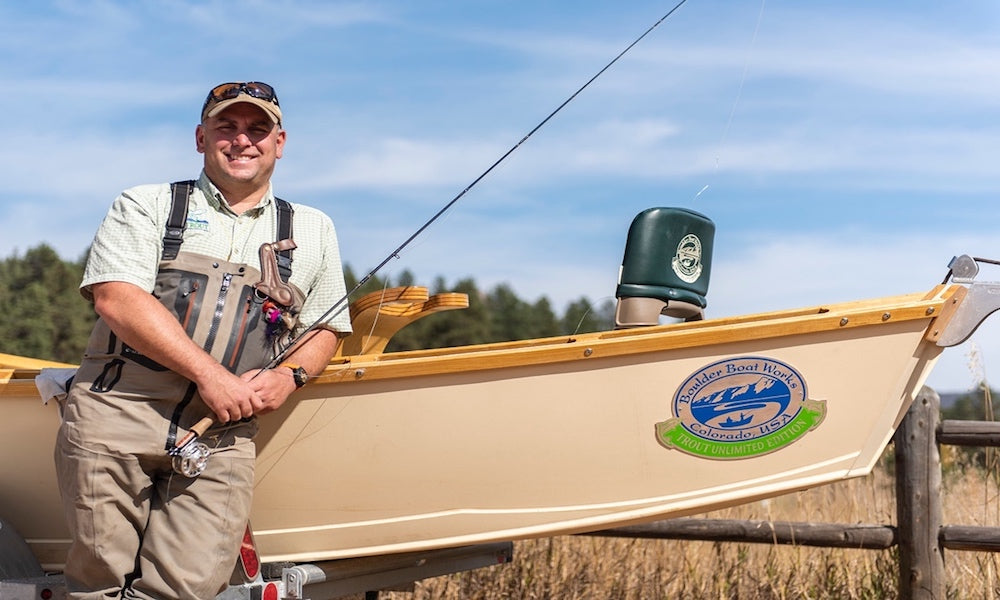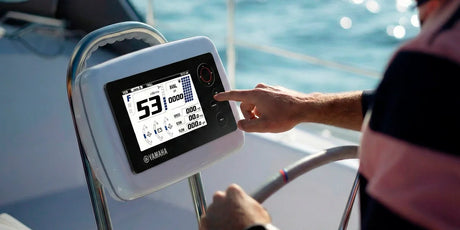PartsVu Xchange Talks Boating host Tonia Becker spoke with Kirk Deeter, a Vice President at Trout Unlimited, the Editor-in-Chief for Trout, Trout Unlimited’s quarterly magazine, and editor-at-large for Field & Stream magazine. Kirk is an accomplished and well-recognized writer in the world of fishing. He has authored or co-authored several books, including The Little Black Book of Fly Fishing and Tideline: Captains, Fly-Fishing, and the American Coast.
Kirk discusses the conservation efforts of Trout Unlimited, information about coldwater fisheries, the conflicting interests of private individuals and public entities, and the potential for angler involvement in preserving trout fishing waters.
Want to listen to the podcast? You can find PartsVu Xchange Talks Boating on Apple Podcasts, Spotify, Amazon Music, iHeart Radio, and Stitcher.
How would you characterize the work of Trout Unlimited, and how did you get involved?
Kirk: When talking about coldwater fisheries, we have to realize that we all have a vested interest in protecting source waters. Whether it’s a spring in the Midwest or snowmelt from the high country in Colorado, protecting source waters affects the quality of water downstream. Taking care of water at the source helps create cleaner water not just for fishing but for drinking and other forms of recreation.
I joined Trout Unlimited many years ago, and Trout Unlimited seems to run in the family. My dad was a member, and my in-laws are members too. As a family, we love to fish, and part of our responsibilities as anglers is taking care of resources.
Years ago, I covered Trout Unlimited as a journalist many times, and I eventually became a permanent member of the full-time crew. Becoming a full-time team member of Trout Unlimited has been like a homecoming to me, a dream come true.
Now, I wake up every morning proud to do what we do. We not only advocate and raise awareness for cold water fisheries, but we also dig in and fix rivers by planting trees, flipping rocks, creating shade, and physically cleaning up to help preserve our fisheries for future generations.

Why are cold water fisheries so challenged?
Kirk: Well, we have the problem of climate change, and there is something to that. We are seeing warming trends that are not good for fish sometimes. Trout like the water to be less than 70 degrees Fahrenheit. They thrive in colder water.
However, because of global warming, water temperatures are rising. We’ve seen some fisheries even have to close or operate with restricted hours out in the west, for example, because daytime temperatures were too high.
Also, we have to watch the events that are triggered by climate change like flooding, fires, runoff, and related issues. They have a chain reaction effect on the ecosystems that are related to coldwater fisheries. Climate change has a trickle-down effect that reaches deep into our environment.
The good news is that there are things we can do to mitigate climate change. We can make a difference. In fact, we’re seeing a lot of rivers in this country that are better than they were twenty or thirty years ago. So I am optimistic that we can continue to develop healthy rivers in the future if we are diligent and do our best.
The magic word is connectivity. Many fish, like salmon, go to the ocean and then back to the river to spawn and create new generations of salmon. However, if they can’t get over dams and back to their spawning grounds, we break the cycle that allows reproduction. So we need to make sure we create and maintain habitats for little fish to happen so we can sustain future life.
How do you manage the conflicting interests of landowners, government agencies, nonprofits, and municipalities?

Kirk: It’s a balancing act, and you have to look for opportunities for win-wins. The good news is that fishing isn’t a political issue, and fishing is where most discussions about conservation start.
Fishing is more of a cultural issue. People from all walks of life enjoy fishing, so it makes it a little easier to find common ground between conflicting interests. Since fishing opens doors for discussion, it’s easier to bridge the gap between competing interests like private landowners and government entities. In general, the conversations come down to the overall health of the waterway, which almost everyone has a vested interest in.
I’ve been fortunate to travel the world to write about fishing. The United States is the envy of the world for the resources that we share. Since there is a public interest in protecting our resources, we can work together to solve problems. It isn’t even a bipartisan effort; it’s more of a non-partisan collaboration to find solutions to get things done.
What challenges lie ahead for cold water fisheries?
Kirk: Cold water fisheries, in a way, are canaries in the coal mine in that we see climate change’s effects in real-time.
I’ve seen rivers change throughout the years. For example, I’ve witnessed hatch seasons for bugs change over time. I’ve also noticed that water levels are different than they used to be. We’ve seen everything from fire ash to floods affect the landscape of our fisheries. You have more than anecdotal evidence when you’re out in your waders, and you see firsthand what the effects have been.
Instead of arguing about whether or not climate change is happening and if it’s having an effect on our resources, let’s get about the business of doing what we can to fix the problems. We can do things to mitigate the effects of climate change. For example, we can plant trees, and planting trees make a huge difference in air quality and shade provision.
Managing how we operate and learning how to cooperate with each other are both critical to the blueprint for success as we tackle these issues.
Can you comment on how fishing unifies people for a cause?
Kirk: It serves as an equalizer of sorts. You could have the most high-powered CEO or a brilliant doctor, for example. They get in the boat with you and realize that they are used to being the smartest person in the room, but now they might not be the smartest person in the boat. It’s neat that there’s always something to learn from nature and other people you’re with.
It’s refreshing for a lot of people to start learning something new and build their skillset as they go. Fishing also makes people feel young again, which is one of the beautiful things about being out in nature.
Fishing is a lot more than just pulling on a fish. It’s a community of people, it’s family, and it’s fun. It’s not only good for physical health to be outside, but it’s also a benefit for many people’s mental health.
So, it’s important for a multitude of reasons to protect what we have. If we don’t guard our resources, we are shooting ourselves in our feet.

What else can people do to protect fisheries?
Kirk: Volunteering is critical to our success. People don’t necessarily have to join our organization. They can seize the opportunity to serve by simply showing up at a river cleanup to help out.
The beauty of Trout Unlimited is that we have so many volunteers. We have over 300,000 members and supporters throughout the country. They collectively put in almost 800,000 volunteer hours every year cleaning rivers, turning rocks, planting trees, and anything else that serves to bolster our environmental movement. The labor value of those hours is immense. Those 800,000 hours would translate into millions of dollars in value.
The more people engage in our cause by reading our stories or visiting tu.org, the better for our conservation efforts. The old saying, “many hands make light work,” holds true. The more hands we have to help, the more effective we can be as a fishing community.
Contributing to conservation can be very rewarding. You feel really good when you’re done, and I’ve had plenty of fun on days when I was gathering large trash bags of stuff. Knowing that you made a difference and truly impacted your fishery is a great feeling.
Check out tu.org for more information or to get involved with the conservation efforts of Trout Unlimited.












